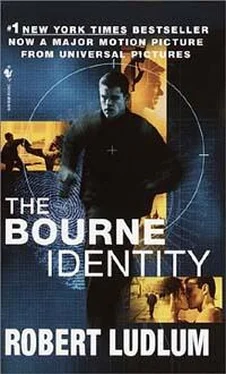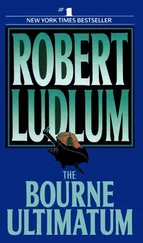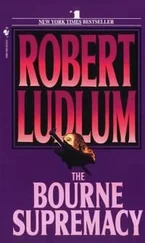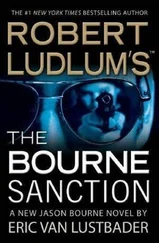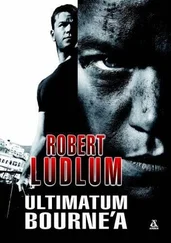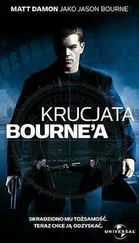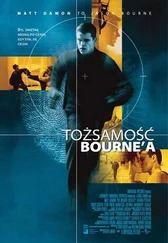There was no conference table in the room; it was an ordinary double occupancy with the standard twin beds, a couch, two armchairs, and a coffee table. It was an unlikely spot to hold a meeting of such consequence; there were no spinning computers to light up dark screens with green letters, no electronic communications equipment that would reach consoles in London or Paris or Istanbul. It was a plain hotel room, devoid of everything but four minds that held the secrets of Treadstone Seventy-One.
The senator sat on one end of the couch, the naval officer at the other. Conklin lowered himself into an armchair, stretching his immobile limb out in front of him, the cane between his legs, while Brigadier General Crawford remained standing, his face flushed, the muscles of his jaw pulsing in anger.
“I’ve reached the president,” said the senator, rubbing his forehead, the lack of sleep apparent in his bearing. “I had to; we’re meeting tonight. Tell me everything you can, each of you. You begin, General. What in the name of God happened?”
“Major Webb was to meet his car at 2300 hours on the corner of Lexington and Seventy-second Street. The time was firm, but he didn’t show up. By 2330 the driver became alarmed because of the distance to the airfield in New Jersey. The sergeant remembered the address—mainly because he’d been told to forget it—drove around and went to the door. The security bolts had been jammed and the door just swung open; all the alarms had been shorted out. There was blood on the foyer floor, the dead woman on the staircase. He walked down the hallway into the operations room and found the bodies.”
“That man deserves a very quiet promotion,” said the naval officer.
“Why do you say that?” asked the senator.
Crawford replied. “He had the presence of mind to call the Pentagon and insist on speaking with covert transmissions, domestic. He specified the scrambler frequency, the time and the place of reception, and said he had to speak with the sender. He didn’t say a word to anyone until he got me on the phone.”
“Put him in the War College, Irwin,” said Conklin grimly, holding his cane. “He’s brighter than most of the clowns you’ve got over there.”
“That’s not only unnecessary, Conklin,” admonished the senator, “but patently offensive. Go on, please, General.”
Crawford exchanged looks with the CIA man. “I reached Colonel Paul McClaren in New York, ordered him over there, and told him to do absolutely nothing until I arrived. I then phoned Conklin and George here, and we flew up together.”
“I called a Bureau print team in Manhattan,” added Conklin. “One we’ve used before and can trust. I didn’t tell them what we were looking for, but I told them to sweep the place and give what they found only to me.” The CIA man stopped, lifting his cane in the direction of the naval officer.
“Then George fed them thirty-seven names, all men whose prints we knew were in the FBI files. They came up with the one set we didn’t expect, didn’t want … didn’t believe.”
“Delta’s,” said the senator.
“Yes,” concurred the naval officer. “The names I submitted were those of anyone—no matter how remote—who might have learned the address of Treadstone, including, incidentally, all of us. The room had been wiped clean; every surface; every knob, every glass—except one. It was a broken brandy glass, only a few fragments in the corner under a curtain, but it was enough. The prints were there: third and index fingers, right hand.”
“You’re absolutely positive?” asked the senator slowly.
“The prints can’t lie, sir,” said the officer. “They were there, moist brandy still on the fragments. Outside of this room, Delta’s the only one who knows about Seventy-first Street.”
“Can we be sure of that? The others may have said something.”
“No possibility,” interrupted the brigadier general. “Abbott would never have revealed it, and Elliot Stevens wasn’t given the address until fifteen minutes before he got there, when he called from a phone booth. Beyond that, assuming the worst, he would hardly ask for his own execution.”
“What about Major Webb?” pressed the senator.
“The major,” replied Crawford, “was radioed the address solely by me after he landed at Kennedy Airport. As you know, it was a G-Two frequency and scrambled. I remind you, he also lost his life.”
“Yes, of course.” The aging senator shook his head. “It’s unbelievable. Why?”
“I should like to bring up a painful subject,” said Brigadier General Crawford. “At the outset I was not enthusiastic about the candidate. I understood David’s reasoning and agreed he was qualified, but if you recall, he wasn’t my choice.”
“I wasn’t aware we had that many choices,” said the senator. “We had a man—a qualified man, as you agreed—who was willing to go in deep cover for an indeterminate length of time, risking his life every day, severing all ties with his past. How many such men exist?”
“We might have found a more balanced one,” countered the brigadier. “I pointed that out at the time.”
“You pointed out,” corrected Conklin, “your own definition of a balanced man, which I, at the time, pointed out was a crock.”
“We were both in Medusa, Conklin,” said Crawford angrily yet reasonably. “You don’t have exclusive insights. Delta’s conduct in the field was continuously and overtly hostile to command. I was in a position to observe that pattern somewhat more clearly than you.”
“Most of the time he had every right to be. If you’d spent more time in the field and less in Saigon you would have understood that. I understood it.”
“It may surprise you,” said the brigadier, holding his hand up in a gesture of truce, “but I’m not defending the gross stupidities often rampant in Saigon—no one could. I’m trying to describe a pattern of behavior that could lead to the night before last on Seventy-first Street.” The CIA man’s eyes remained on Crawford; his hostility vanished as he nodded his head. “I know you are. Sorry. That’s the crux of it, isn’t it? It’s not easy for me; I worked with Delta in half a dozen sectors, was stationed with him in Phnom Penh before Medusa was even a gleam in the Monk’s eye. He was never the same after Phnom Penh; it’s why he went into Medusa, why he was willing to become Cain.”
The senator leaned forward on the couch. “I’ve heard it, but tell me again. The president has to know everything.”
“His wife and two children were killed on a pier in the Mekong River, bombed and strafed by a stray aircraft—nobody knew which side’s—the identity never uncovered. He hated that war, hated everybody in it. He snapped.” Conklin paused, looking at the brigadier. “And I think you’re right, General. He snapped again. It was in him.”
“What was?” asked the senator sharply.
“The explosion, I guess,” said Conklin. “The dam burst. He’d gone beyond his limits and the hate took over. It’s not hard; you have to be very careful. He killed those men, that woman, like a madman on a deliberate rampage. None of them expected it except perhaps the woman who was upstairs, and she probably heard the shouts. He’s not Delta anymore. We created a myth called Cain, only it’s not a myth any longer. It’s really him.”
“After so many months …” The senator leaned back, his voice trailing off. “Why did he come back? From where?”
“From Zurich,” answered Crawford. “Webb was in Zurich, and I think he’s the only one who could have brought him back. The ‘why’ we may never know unless he expected to catch all of us there.”
“He doesn’t know who we are,” protested the senator. “His only contacts were the Yachtsman, his wife, and David Abbott.”
Читать дальше
